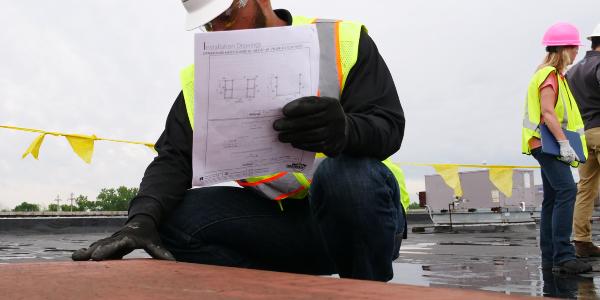UP TO THE MINUTE
Navigating contractor safety risks: Strategies and best practices for roofing contractors

By Cotney Consulting Group.
Managing safety risks associated with external contractors demands a proactive and comprehensive approach.
In today's fast-paced project environments, collaboration with external contractors is commonplace, bringing a wealth of expertise to the table. However, this collaboration also introduces a myriad of safety challenges that can jeopardize the well-being of workers and the success of projects. One of the primary concerns in this scenario is the inconsistent safety protocols adopted by different contractors, leading to potential miscommunication and safety gaps. To address these challenges effectively, ensuring that all contractors adhere to a unified safety standard and receive proper training is crucial. In this article, we will explore the risks associated with contractor involvement in roofing projects and worker safety and explore strategies and best practices to safeguard your projects and personnel.
Overview of risks from contractor involvement
When external contractors become an integral part of your roofing projects, they bring diverse experiences and skills. However, this diversity also means varying safety standards and practices. Inconsistent safety protocols across contractors can lead to confusion, miscommunication and accidents on the job site. Identifying and understanding these risks is the first step toward effective risk management.
Strategies for evaluating safety risks with external contractors
It is essential to conduct thorough assessments before and during the collaboration to evaluate safety risks associated with external contractors. Start by scrutinizing the safety records and past performance of the contractors. Look for certifications and training programs attended by their workforce. On-site evaluations and audits can provide valuable insights into their safety practices and regulation adherence. By understanding the potential risks each contractor brings, you can make informed decisions and choose collaborators who prioritize safety as much as you do.
Best practices for safety protocols that ensure accountability
Establishing a robust set of safety protocols is paramount to ensuring accountability among external contractors. Clearly outline safety requirements, procedures and expectations in contracts and agreements. Regular safety meetings and training sessions should be conducted to reinforce these protocols. Implement a reporting system where workers can anonymously report safety concerns. By fostering a culture of transparency and accountability, you create an environment where everyone understands the importance of safety and actively participates in maintaining it.
Key performance indicators (KPIs) to assess contractor safety performance
Tracking Key performance indicators (KPIs) is instrumental in assessing the safety performance of external contractors. Metrics such as incident rates, near misses and compliance with safety protocols can provide valuable data. Regularly analyze these KPIs to identify trends and areas for improvement. Utilize this data-driven approach to recognize high-performing contractors and address safety issues promptly, ensuring continuous improvement in safety standards.
Promoting a safety culture and ensuring adherence to safety regulations
Promoting a safety culture goes beyond implementing protocols; it involves instilling a mindset of safety consciousness among all workers, including external contractors. Regular safety training, toolbox talks and awareness campaigns can reinforce the importance of safety on the job site. Additionally, staying updated with local, state and federal safety regulations is crucial. Compliance with these regulations ensures legal adherence and contributes significantly to maintaining a safe working environment.
Role of technology in proactive safety risk assessment
Advancements in technology have revolutionized safety risk assessment. Embrace tools such as wearables, drones and software solutions that provide real-time data on worker activities and job site conditions. These technologies enhance safety monitoring and enable proactive identification of potential risks. By leveraging technology, you can stay ahead of safety challenges and implement preventive measures, mitigating risks before they escalate into accidents.
In conclusion, managing safety risks associated with external contractors demands a proactive and comprehensive approach. Roofing contractors can successfully navigate these challenges by evaluating risks, establishing clear protocols, tracking performance through KPIs, promoting a safety culture and utilizing technology. Empowered with these insights, you are well-equipped to enhance project and worker safety, ensuring the success of your roofing projects. Seize this opportunity to elevate your safety expertise and drive safer, more successful projects in the future.
Learn more about Cotney Consulting Group in their Coffee Shop Directory or visit www.cotneyconsulting.com.


















Comments
Leave a Reply
Have an account? Login to leave a comment!
Sign In